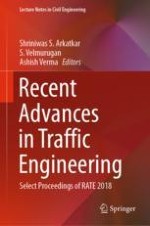2020 | OriginalPaper | Chapter
Methodology to Identify a Key Set of Elements Influencing Bicycle-Metro Integration: A Case Study of Hyderabad, India
Authors : Jay Panchal, Bandhan Bandhu Majumdar, V. Vinayak Ram, Sridhar Raju
Published in: Recent Advances in Traffic Engineering
Publisher: Springer Singapore
Activate our intelligent search to find suitable subject content or patents.
Select sections of text to find matching patents with Artificial Intelligence. powered by
Select sections of text to find additional relevant content using AI-assisted search. powered by
